What does happiness mean to you?
Today, March 20th, is the UN International Day of Happiness. A day that whose ambition is to create a happier and kinder world together by adopting simple, daily practices.
This year’s theme is ‘Be Mindful. Be Grateful. Be Kind’ and to mark the day mentl reached out to community leaders, clinicians and public figures to ask:
- What does happiness mean to you?
- What are you grateful for?
- How do you change your mood when you are feeling low?





For Nahida Nayaz Ahmed, Chair of Mental Health Taskforce with the Department of Health Abu Dhabi, purpose has a meaningful link to happiness.
“To me ‘happiness’ is a state of mind, it’s not a constant state, but a fleeting emotion, that appears in varying degrees every now and then. Knowing that I served my purpose well, by which I mean I made a difference, and created a positive change in someone’s life generates feeling of Happiness. It could be something big such as realisation that I raised my children to be kind or that I changed the course in life for a patient, to something routine such as I made someone feel “safe and accepted” in the moment. I rejoice my role and feel good about myself when I add value to someone or someplace.

“I am most grateful for my children and my parents as they have shaped me into who I am. I am cognizant of my behavior and attitude as it directly influences them, and constantly strive to make them proud. I am also grateful for good health and opportunity to help people who are most vulnerable and lonely. Having people confide and trust me with their most intimate fears and concerns is a privilege I cherish deeply.
“My strategy to improve my mood when I am low, is to retract from the chaos and connect to my Creator. I feel safe knowing He is protecting me and feel loved reflecting on all the blessings He has granted me. I try to do this often, ‘pause, isolate and reflect’ and when I emerge from the solitude, I am rejuvenated with a renewed sense of purpose. And fulfilling that purpose generates happiness which makes me grateful and the cycle thus continues.”
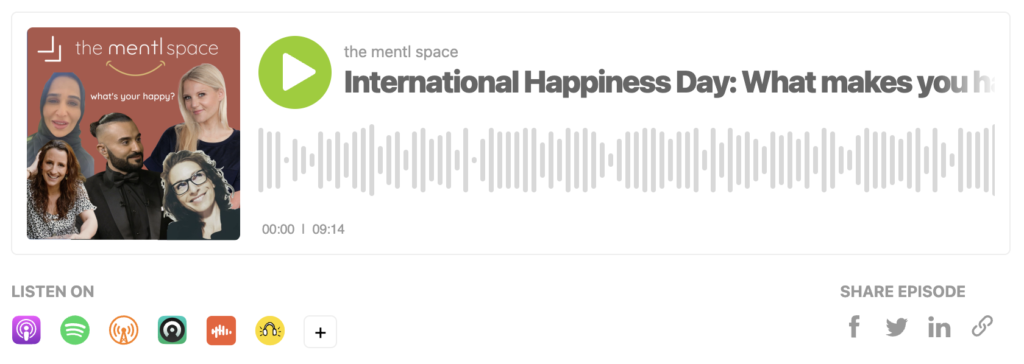
Love underpins how Kris Fade, star of Virgin Radio’s The Kris Fade Show and Netflix’s Dubai Bling, and founder of Fade Fit, views happiness.

“International happiness day. Wow. It’s great that we get to have one, but I would hope that we would celebrate it every day. And, as cliche as that sounds, it’s probably what we want to try to achieve as a race, but it is unachievable, you can’t be happy every single day.
“I try to wake up every single morning and I have a routine where I walk out my door, it’s usually around 5am and pitch black, and I raise my hand to the air and I just say thank you for another great day, and I’m really saying thank you for the day that I had yesterday.
“I think every day that we’re on this earth breathing, and we’ve got our health is really what I’m truly grateful for. And until that’s get taken away from you for a moment you don’t really realise it. So, just be happy for what you have, and that’s the basics and health, your family, feeling loved and being loved, and being able to love someone. I think it’s so important, that’s what makes me happy.”
For Jessica Smith, Paralympian, Medal of the Order of Australia awardee, and founder of TOUCH Dubai; an inclusive talent management and disability inclusion consultancy, being self-aware is a big key to happiness.
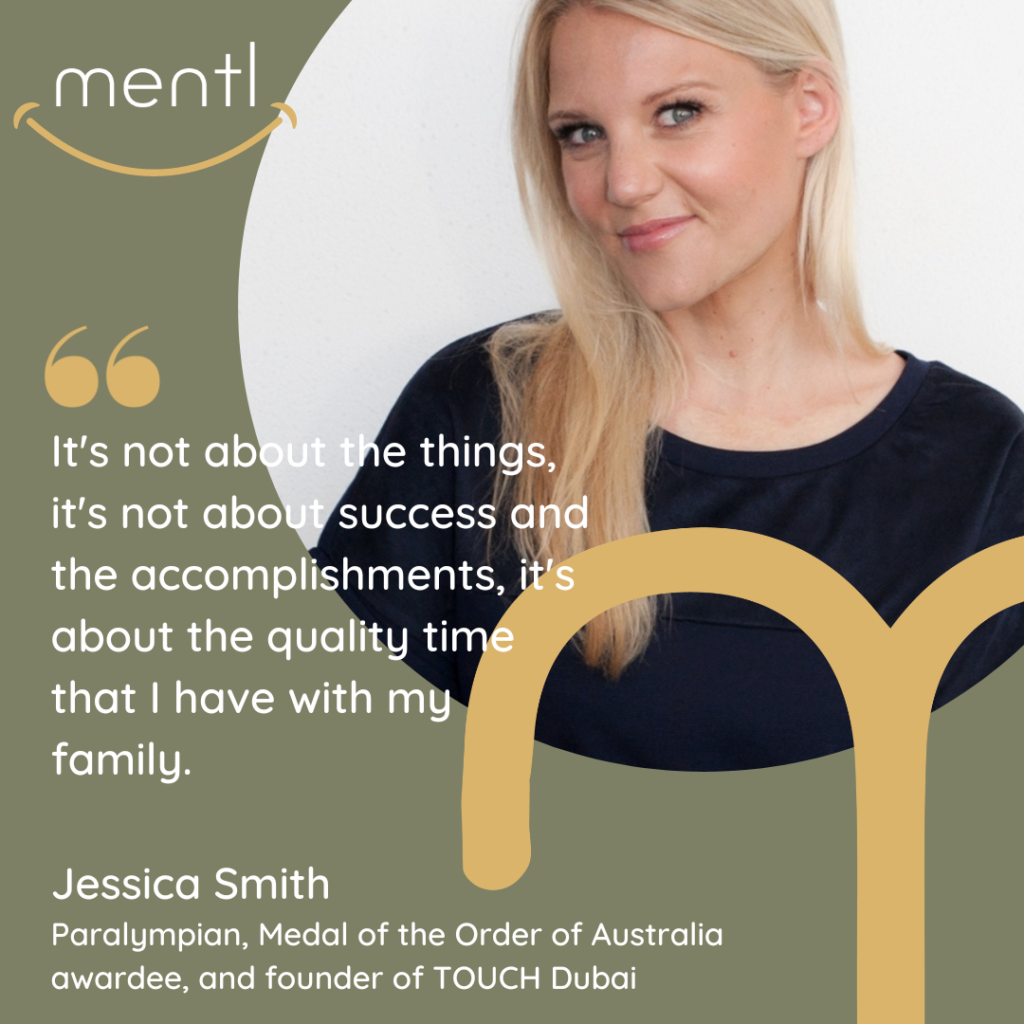
“For me, happiness is about being content. And, I think when someone asks what is happiness for me I see that in my children.
So, it’s not about the things, it’s not about even the success and the accomplishments, it’s more about the time and the quality time that I have with my family. And that gives me that level, or that feeling of contentment.
And then a top tip for improving mood, if you’re feeling down is to really try to bring a level of self-awareness as to what that mood and that emotion is, without trying to force it away too quickly, allowing ourselves to try and understand what’s actually going on. This will then help us to take the next step forward into some practical and logistical ways to boost our mood.
“So, whether that means, we need a little bit more sleep, or we need to remove ourselves from a situation and get some fresh air. Just really simple things that can be immediate mood boosters, I think, make a huge difference, but not doing that to try and suppress how we’re feeling. We really need to make sure that we’re aware of what those more negative emotions are or why they’re there.”
Peace was core to happiness for Dr Sara Al Dallal, President of Emirates Health Economics Society at Emirates Medical Association.
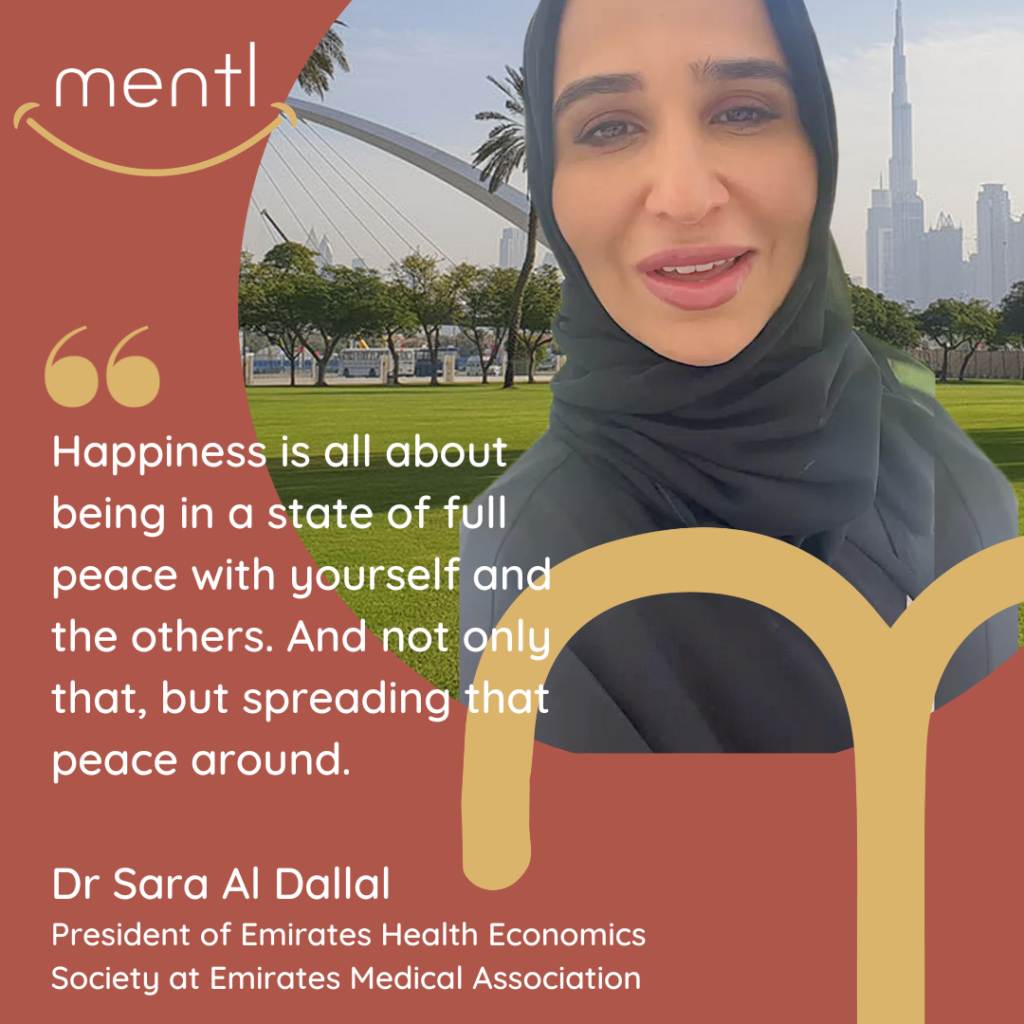
“Happiness? Happiness is all about being in a state of full peace with yourself and the others, and not only that, but spreading that peace around. Happy International Happiness Day.”
‘Proactive gratitude’ is one of the foundations for Ali Matar, Head of LinkedIn Middle East & Africa.

“For me happiness can be found through human relationships that give our life meaning.
“What gives me joy is to see that I sometimes can have positive impact on someone else’s life- this for me is the ultimate level of satisfaction. I try to practise ‘proactive gratitude’ because I truly believe that no matter how bad things might seem, they could always be worse. I decide to focus on the silver linings and see the blessing in everything.
“Tip: always find the time to do something small that brings you energy, even if it seems mundane. For me that can be an hour of gym, watching an episode of Seinfeld, or sometimes just having a Nutella crepe.”
Gratitude is also key for Naim Maadad, CEO and Founder of Gates Hospitality.
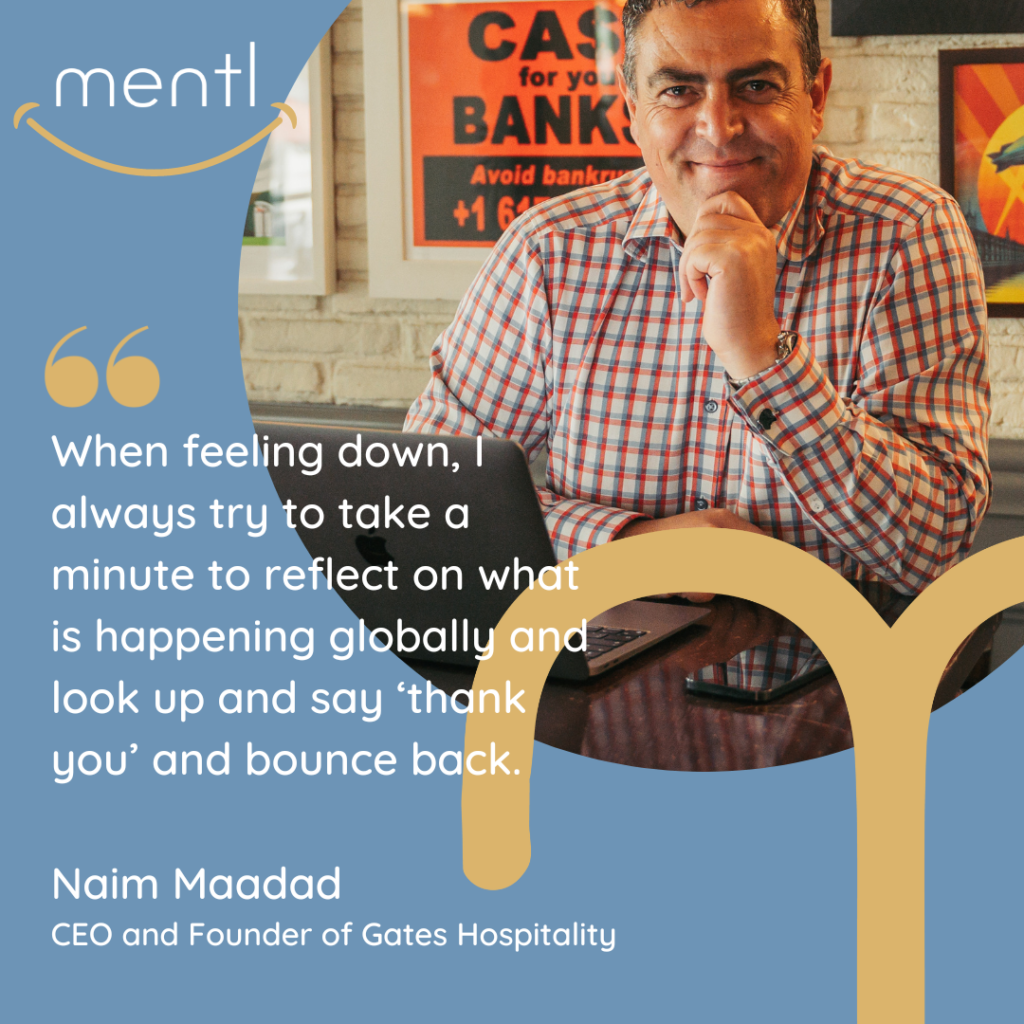
“I am grateful for my family that offers nothing but unconditional love.
“When feeling down, I always try to take a minute to reflect on what is happening globally and look up and say ‘thank you’ and bounce back. There is a lot to be grateful for this in this life.”
Stop trying to be happy, is part of the advice from Dr. Louise Lambert, Associate Professor with the Canadian University Dubai and Head of Happiness Policy, Programming, and Research with HappinessMatters.org.
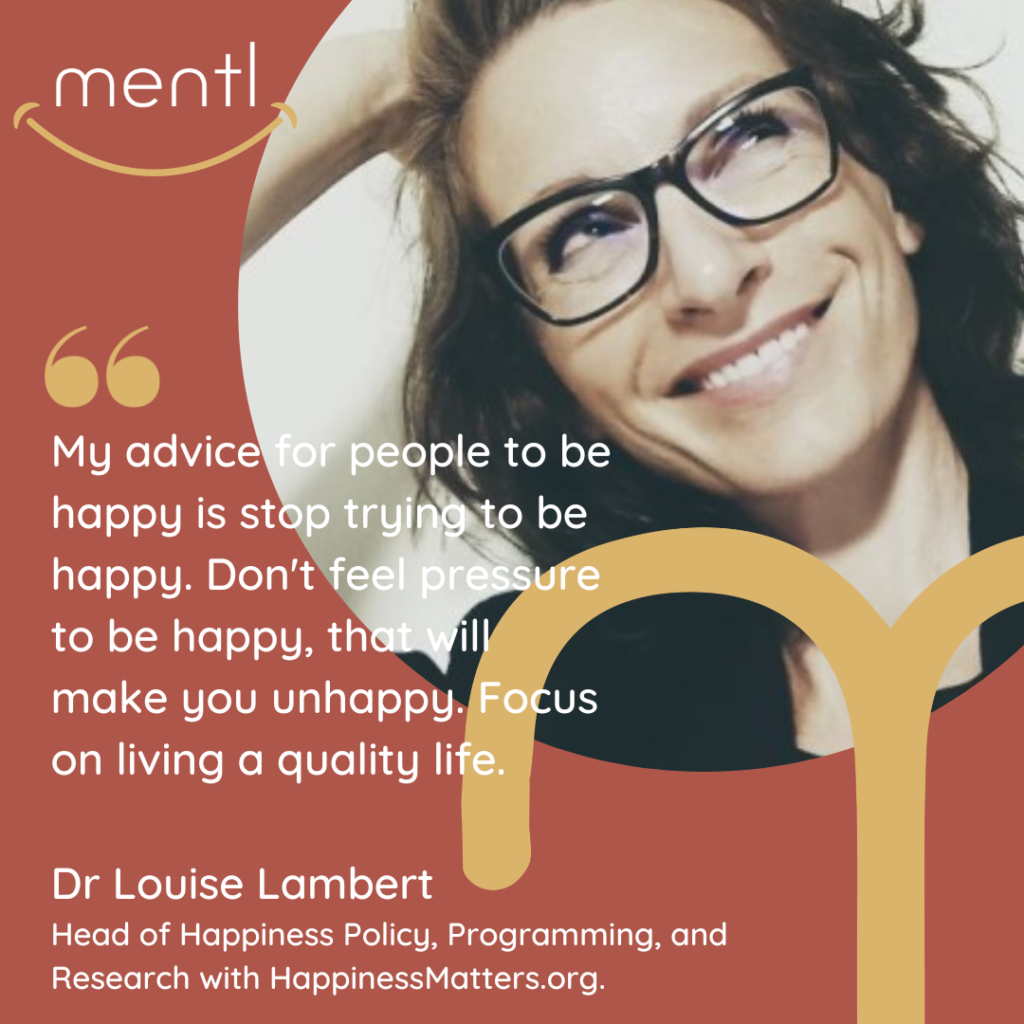
“Okay what happiness means to me? I’m going to have maybe a bit of contradictory advice, despite the fact that, I talk about positive psychology interventions. They do work, there is evidence for them, they’ve been used around the world, millions of people use them, but they don’t work for everybody.
“And they don’t work for everybody in the same way, and they don’t equally work. What am I trying to say they don’t work for everyone in the same way, not everybody likes all of them.
“Your personality matters, circumstances also matter. You might be really into gratitude at some point in time and then go, ‘you know what, I hate gratitude, I’m going move to something else’.
“So, my advice for people to be happy is stop trying to be happy. There are strategies you can use, of course, if those work for you, great carry on. But don’t feel pressure to be happy, that will make you unhappy.
“Also don’t feel pressure to use the standard pathways to happiness. Everybody talks about gratitude, gratitude, I hate gratitude, it doesn’t work for me, it puts me in bad mood. And there’s a lot of research showing that again on some people certain interventions backfire. Given their personality characteristics, if there’s a history of trauma, or this or that, so don’t blindly do what everybody else is doing because you feel like that’s what you’re supposed to do.
“Instead, what I’ve tried to do is just focus on living a quality life, and quality does not mean luxury, Quality just means ‘is this the best choice I could be making for myself right now? Is this something that I want to do? Or is it something that other people want me to do?’ And if that’s the case, then the answer is no.
“Be mindful of what you’re doing your habits, your lifestyle choices, and evaluate those often. Because they may work well at certain points in your life, and then less so later. And when they stop working, or stop giving you the same effects, then then change your strategy. Our strategies are supposed to change with life.”
For Mimi Nicklin, bestselling author of Softening The Edge – A Leadership book on Empathetic Influence & Creativity, and Creative CEO of Freedm, happiness can be found in balancing the now with the future.
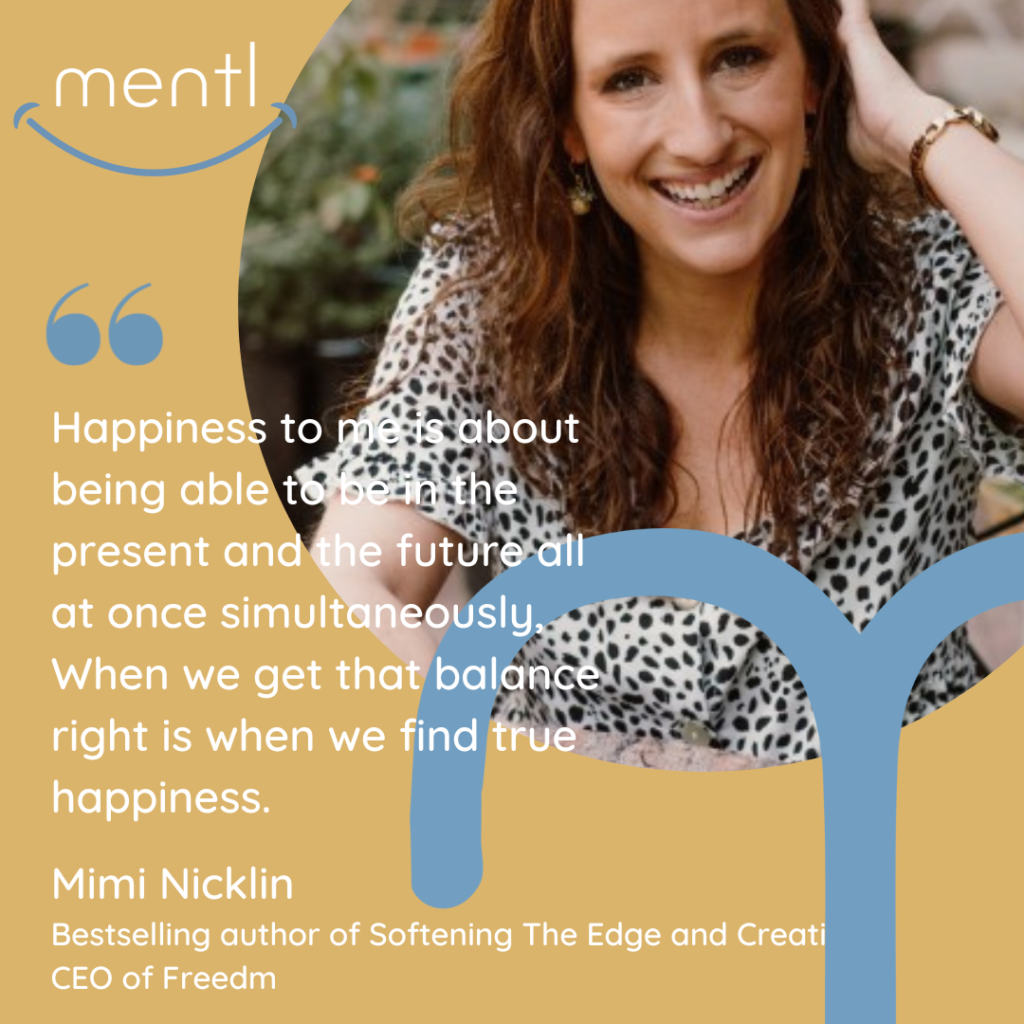
“Happiness to me is about being able to be in the present and the future all at once simultaneously, with a sense of peace, a sense of peace, that where you are right now is exactly where you’re meant to be.
“And where you’re going, is exactly where you’re meant to go. For me when we get that balance right, the now and the future, is when we find true happiness.”
For Helen Farmer, host of ‘Afternoons with Helen Farmer’ on Dubai Eye 103.8fm, it’s about feeling content in everyday life rather than ‘unrealistic expections’.
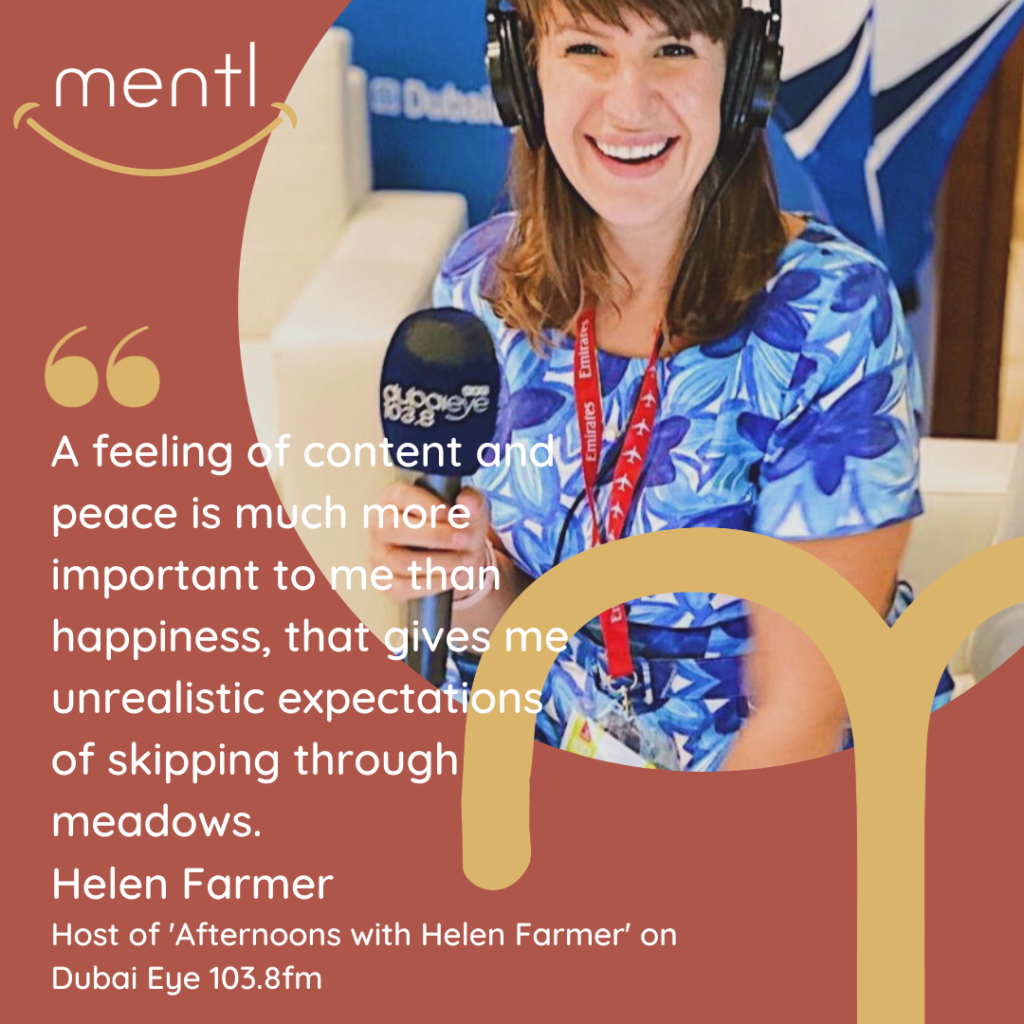
“I’m starting to realise than a feeling of content and peace is much more important to me than happiness, that gives me unrealistic expectations of skipping through meadows. For when I need to improve my mood, I get outdoors, squeeze my kids, watch silly videos, have a bath, sleep, voice message my best friend. I know what I need in my arsenal now.”
Dr Kate Robinson, clinical psychologist, and co-founder & clinical director at My Therapy Assistant
“Happiness for me is an emotion I enjoy but like for everyone, it’s something that comes and goes and depends on lots of factors that I often can’t control.
“Rather than chasing the feeling, I try to make sure I’m living a full and meaningful life. For me that means spending as much time as I can with loved ones, travelling when I can and challenging myself with my work.
“My top tip for improving mood if you’re feeling down would be to think about what matters to you in your life and make a small step in that direction – for example,
“If fitness is important to you in your life then doing whatever form and length of exercise you can manage in that moment, if contributing is a value of yours then doing something that benefits someone else. And, if intimate relationships are something you want in your life then do something to nurture the one(s) you have, or take steps closer to developing new connections.”